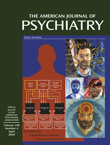Ziprasidone Induction of Hypomania in Depression?
To the Editor: Atypical antipsychotics are being increasingly used in the acute and maintenance treatment of bipolar illness. Although more evidence is needed, they are often reported to be “thymoleptic,” having therapeutic benefits for both mania and depression, in bipolar patients. However, a review by McElroy and Keck (1) indicates that risperidone and olanzapine occasionally precipitate mania or hypomania in bipolar depressed patients. We report on three patients for whom we believe ziprasidone precipitated a hypomanic syndrome while it was being used to treat depressive symptoms.
Mr. A was a 43-year-old man with recurrent major depressive disorder that had been treated with partial success with sequential trials of fluoxetine, venlafaxine, buproprion, and lamotrigine. All were discontinued because of side effects and/or lack of efficacy. Mr. A began taking ziprasidone, 20 mg b.i.d., for 1 week, then his dose was increased to 40 mg b.i.d. He began to experience insomnia, waking up at 3:00 a.m. He also reported feeling “really good” and “wide open” and said, “I haven’t had energy like this for 15 years” and that he was “washing dishes and cleaning continuously.” His dose was reduced to 40 mg at bedtime; his insomnia and subsequent euthymia remitted. Mr. A has remained fully recovered.
Mr. B was a 31-year-old man with a long history of generalized anxiety disorder, attention deficit hyperactivity disorder, and recurrent depression. He had previously taken nefazadone, sertraline, and buproprion without an improvement in symptoms. He began taking ziprasidone, 20 mg b.i.d., and within 4 days he described feeling “wonderful” and “euphoric.” He had racing thoughts, “great powers of concentration,” and was impatient and irritable with others. After Mr. B had been in this state for 2 weeks, we decreased his ziprasidone dose to 20 mg/day, but he then experienced “profound depression,” which persisted despite ziprasidone discontinuation.
Ms. C was a 33-year-old woman with a history of treatment-resistant major depression with panic attacks. She was hospitalized, and her condition was maintained with buproprion therapy, from which she sustained some but not sufficient antidepressant benefit. Ms. C was given ziprasidone, 20 mg b.i.d., and within 10 hours she experienced a marked increase in energy, reported feeling “wonderful,” and was able to be discharged. At home she continued to experience a marked increase in energy and an elevated mood. However, 3 days after starting to take ziprasidone, she experienced severe insomnia followed by a relapse into her previous depressive symptoms and a recurrence of panic attacks. Ziprasidone was discontinued, and risperidone treatment was begun. The dose was titrated to 3 mg/day, which produced mood stabilization (euthymia) and a resolution of panic attacks and insomnia.
These three cases and anecdotal reports from colleagues suggest that ziprasidone, like other atypical antipsychotics, may precipitate a “hypomanic syndrome” in unipolar patients or possibly “unmask” latent bipolar illness. The appropriate management of such patients, whether by lowering doses, raising doses, discontinuing ziprasidone, or adding mood stabilizers awaits further clinical investigations.
1. McElroy SL, Keck PE Jr: Pharmacological agents for the treatment of acute bipolar mania. Biol Psychiatry 2000; 48:539-557Crossref, Medline, Google Scholar



